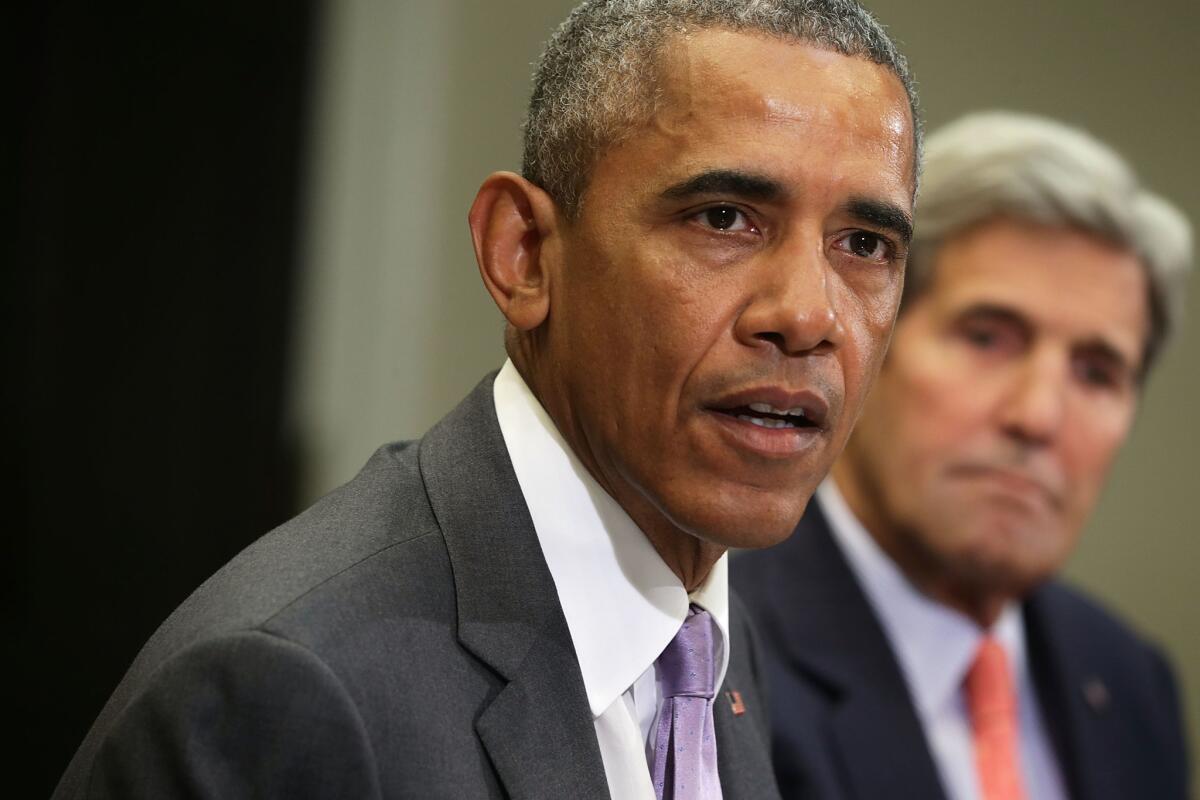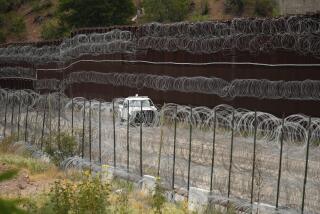U.S. will accept 10,000 Syrians, fewer than refugee advocates seek

President Obama has directed his administration to take in at least 10,000 refugees from Syria over the next year, White House officials said Thursday.
Reporting from Washington — Under international pressure to ease a deepening humanitarian crisis, President Obama on Thursday ordered his administration to accept at least 10,000 Syrian refugees for resettlement over the next year, an increase compared with the 1,300 brought to the U.S. since the war started but well short of the numbers that human rights groups and others had sought.
White House Press Secretary Josh Earnest announced Obama’s decision as administration officials said they were considering increasing the ceiling for resettlement of refugees from all countries by perhaps as much as 30,000 to a total of 100,000. Many, but not all of those would be Syrians, officials said.
Refugee advocates quickly declared the numbers inadequate for a 4-year-old crisis that has driven 4 million people from the devastated country. And because of technical challenges and political resistance in Congress, even meeting those goals may prove elusive, U.S. officials and experts said.
Despite repeated announcements of plans to increase resettlement over the last two years, U.S. agencies have struggled to clear refugees through a vetting process that, because of security considerations, takes 18 to 24 months. Although there is growing public sympathy for the displaced, those security concerns have many lawmakers leery of bringing in more Middle Eastern refugees. California is the No. 1 resettlement destination.
Before “opening the floodgates,” the administration “must prove to the American people that it will take the necessary precautions to ensure that national security is a top priority,” said Sen. Charles E. Grassley (R-Iowa), chairman of the Senate Judiciary Committee, which oversees the program.
A senior State Department official acknowledged this week that in considering ramping up the program, the key issues would be whether Congress supports it and whether the vetting can be sped up — without risking security — to bring in more refugees more quickly.
The administration has been under intense pressure to admit more refugees at a time when a flood of migrants from many countries has strained Europe’s resources and caused political discord within the European Union. As Germany, a country of fewer than 80 million people, has said it expects to receive 800,000 asylum-seekers this year, European government and relief officials have been demanding that America, four times Germany’s size and a traditional open door for immigrants, step up its efforts.
David Miliband, chairman of the International Rescue Committee and a former British foreign secretary, has demanded that the U.S. accept 65,000 Syrian refugees by the end of next year.
U.S. officials say the program is not intended to address the plight of most victims of foreign wars and disasters, but only to help the hardest-hit and most vulnerable, including children and the ill. The best solution, they say, is to help the refugees in their own countries, or as nearby as possible.
But even with such limited goals, the resettlement program has struggled. State Department officials announced in 2013, and then again at the end of last year, that they would sharply increase the number of Syrians accepted for resettlement.
Despite those declarations, the flow of Syrians has remained a trickle, and the flow of refugees of all nationalities has stayed flat over Obama’s time in office. The administration actually lowered its ceiling for resettlement early in Obama’s presidency because of concern that officials couldn’t vet enough of them to reach the limit.
The vetting is painstaking. The first step is for U.N. officials to refer the refugees for consideration, a step that can itself take time. Then the refugees must be reviewed by the Department of Homeland Security and other U.S. agencies, with names checked against U.S. government databases to ensure that they’re not “liars, criminals, or would-be terrorists,” the senior State Department official told reporters Wednesday.
“This is something that slows down the process, and it’s taken very seriously by everyone involved,” said the official, who asked not to be identified because of State Department rules.
Senior U.S. officials say they believe they have worked out some kinks in the system that began when authorities tightened standards following the Sept. 11 attacks. Yet it has sometimes been difficult to vet foreign nationals, even in the face of political urgency.
U.S. officials worked hard to resettle Iraqis who had worked with the U.S. during the war. Congress created a special program for Iraqi candidates in 2007. But only about 20% of the slots have been filled, say advocates for the Iraqis.
U.S. lawmakers and refugee advocates who favor a larger resettlement program say they hope growing public sympathy will allow the program to be accelerated.
“We’re really getting some traction,” said Anna Greene, Washington advocacy director for the International Rescue Committee.
But many advocates want far more than what has been promised.
Soon after Earnest’s announcement, the advocacy group Human Rights First said in a statement that accepting 10,000 Syrians was “not enough to make a significant impact on the global refugee crisis.” The group demanded that the figure be raised to 100,000.
Resistance has been strong from opponents of resettlement.
Rep. Michael McCaul (R-Texas), chairman of the House Homeland Security Committee, warned Thursday against increasing resettlement, saying the administration should not be “surging” thousands of additional Syrians when law enforcement officials don’t have intelligence to ensure the applicants don’t pose a security threat.
Lawmakers expressed “varying views” when Secretary of State John F. Kerry and other officials briefed them Wednesday on the administration’s desire to increase resettlement, the senior State Department official acknowledged.
Another issue is whether Congress will be willing to spend more on resettlement in a year of tight budgets. State Department officials say they don’t yet have cost estimates for the increases they are weighing. They say the 30,000 figure mentioned by Kerry on Wednesday was not firm.
But one Senate aide who favors increasing resettlement said it will be important that the government can provide enough money for the refugees to live on while they seek jobs. The program aims to support the refugees for the first six months of their stay.
“There is a question of how we pay for it,” said the aide, who declined to be identified citing office rules. “You need to spend enough to ensure they make the adjustment. You don’t want people jobless and homeless on the streets of L.A.”
Twitter: @richtpau
ALSO:
Which countries are taking in Syrian refugees?
A heavy price paid for botched terrorist raid by Philippines and U.S.
Severe flooding in Japan washes away homes, strands dozens on rooftops
More to Read
Sign up for Essential California
The most important California stories and recommendations in your inbox every morning.
You may occasionally receive promotional content from the Los Angeles Times.











